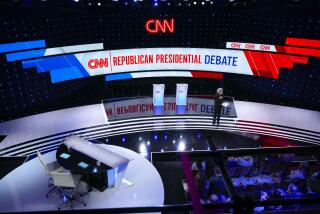Campaign Cash Kicks Back as Subsidies and Giveaways
- Share via
As the campaign finance debate moves from the Senate to the House, much of Washington is euphoric about the chance to pass the most comprehensive reform package in a generation. If we are really serious about severing the link between special interests and government, however, we must do more than take money out of politics. We must take the politics out of money--that is, strip out the subsidies and tax giveaways Congress bestows at the behest of high-dollar campaign donors.
The McCain-Feingold package has done well because of a rising tide of public anger toward a political system that seems ever more skewed toward the privileged and powerful. Yet while the chattering class focuses on high-profile examples of the role of money in politics--Buddhist temples, Lincoln Bedroom overnighters, foreign funds flowing to both major parties--what really matters is the story behind those stories: why millions upon millions of dollars flow into campaign coffers in the first place.
Shifting around the rules on soft money or spending caps would make a difference, but it would hardly slow the expanding influence of powerful special interests that manipulate the political system to their own ends. Private funds will always find a way to affect the political process. The task for reformers is not just to limit the flow of money into politics but to limit the reason for this deluge in the first place.
According to some estimates, the federal government spends more than $100 billion a year on special subsidies and tax breaks for special interests. This “corporate welfare” weakens the economy and weighs down the budget. Worse, it breeds distrust.
Never is this more true than at tax time. Americans have just waded through a veritable sea of W-2s and 1040s, muttering about the complexity of the tax code. Once 14 pages long, it is now 17,000 pages.
Yet its bulk and intricacy--contrary to the rhetoric of flat-taxers like Steve Forbes--do not come from deductions encouraging charitable donations or reducing student loans. They come from the myriad of special exemptions for the wealthy and powerful, indecipherable to all but the most sophisticated accountants.
At the end of the day, what infuriates Americans is not the complexity of the code, or even the rate at which they are taxed. What makes them angry is the knowledge that those who can afford it will hire an army of lawyers and lobbyists to help them shirk their obligations, and everyone else will be left holding the bill.
Contrary to what many contend, Americans do not hate successful business people or the wealthy--these are fundamental elements of the American Dream. What they despise is unfairness. When they see the loopholes and giveaways that take taxes from those who shop at the Price Club in order to enrich those who lounge at the country club, or when they hear about budgetary boondoggles that insulate the privileged from the same struggles they face, then they come to feel that government is the private plaything of the powerful and that they are on the outside, looking in. This, to them, is not what democracy is all about.
In many instances, the tax system today is not one of “progressive” taxation as much as it is one of “protective” taxation--shielding corporations from competition and the need to innovate. It puts the brakes on the spirit of entrepreneurship and open competition.
Not so long ago, decades of public anger against welfare--a system that was perceived as transferring money from those who worked hard to those who refused to do their share--peaked, and we got welfare reform. That same kind of anger is building against welfare for the rich--government handouts to powerful interests that use campaign contributions to get special treatment.
But if we want lasting reform that really cleans up the system, we will need to do more than look at money coming into Washington from corporations and special interests. We need to look at the money Washington is spending on their behalf.
More to Read
Get the L.A. Times Politics newsletter
Deeply reported insights into legislation, politics and policy from Sacramento, Washington and beyond. In your inbox twice per week.
You may occasionally receive promotional content from the Los Angeles Times.










